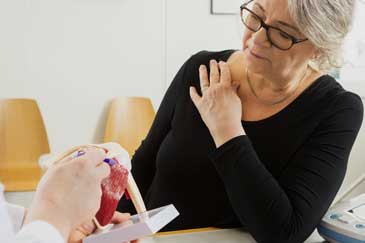Orthopedic Services
Shoulder Rotator Cuff Repairs
Shoulder Rotator Cuff Repairs
The shoulder rotator cuff is a group of muscles and tendons that surround the shoulder joint, keeping the head of your upper arm bone firmly within the shallow socket of the shoulder.
What is the Shoulder Rotator Cuff?
A shoulder rotator cuff injury can cause a dull ache in the shoulder. It may hurt or worsen when you try to sleep on the involved side. The rotator cuff is a group of four muscles that come together as tendons to form a cuff over the head of the upper arm bone or humerus.
The four muscles, Supraspinatus, Infraspinatus, Subscapularis and Teres Minor, originate from the shoulder blade or scapula. The rotator cuff tendons attach to the head of the humerus in special spots referred to as the greater and lesser tuberosities. A tuberosity fracture may appear at the head of the arm's humerus bone, where the muscles of the rotator cuff are attached to. Its rounded section is called the greater tuberosity. The rotator cuff helps to lift and rotate the arm and to stabilize the ball of the shoulder within the joint.

What causes a rotator cuff to tear?
A rotator cuff tear may result from an acute injury, such as a fall during water or snow skiing, a fall playing tennis, a fall stepping on and off a boat or any other fall where you may land on your shoulder. It may also be caused by normal age-related wear and tear with degeneration of the tendon.
You may feel pain in the front of your shoulder that radiates and hurts all the way down the side of your arm. Lifting or reaching for things may be especially difficult and painful. You may feel a constant sharp pain when you try to sleep on the affected side. You may also note weakness of your arm and difficulty with routine and light activities, such as lifting a coffee cup, reaching behind your back or simply by trying to comb through your hair. If the tear occurs with injury, you may experience acute pain, a snapping sensation, and immediate, progressive weakness of your arm.
It has been determined that degenerative injuries are due to long-term overuse. People most at risk for these injuries include athletes, particularly tennis players, baseball players, rowers, and wrestlers. People with jobs that require repetitive, heavy lifting, such as furniture movers, warehouse duties, painters and carpenters. People above 40 years of age.
What is a Mini-Open RTC
In case nonsurgical treatments should not be successful in relieving your pain, we may recommend surgery. Dr. Hudanich performs mini-open rotator cuff repairs, which means that during the mini-open repair the deltoid muscle is split to allow access to the torn tendon. By not fully detaching the deltoid, done in an open shoulder rotator cuff repair, the patient avoids possible complications with the deltoid muscle. The mini-open repair is often done in conjunction with an arthroscopic component so additional pathology like bone spurs, may be quickly assessed and remedied. During rotator tear surgery the torn tendon is reattached back down to the bone for complete tears or the tear in the tendon, for partial tears, is sutured back together. In most RTC or rotator cuff surgeries, the acromion bone is filed down smoothly acromioplasty preventing future tears.
Additional helpful information provided by the American Academy of Orthopaedic Surgeons
Rotator Cuff Tears: Surgical Treatment Options
